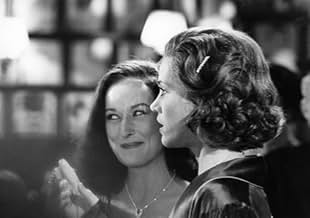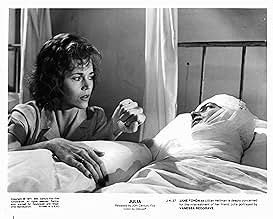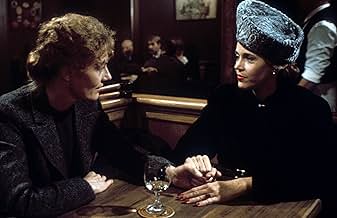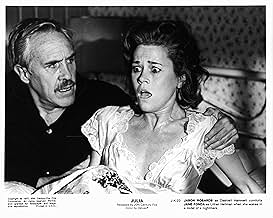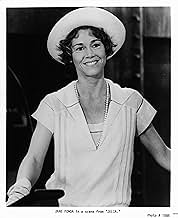At the behest of an old and dear friend, playwright Lillian Hellman undertakes a dangerous mission to smuggle funds into Nazi Germany.At the behest of an old and dear friend, playwright Lillian Hellman undertakes a dangerous mission to smuggle funds into Nazi Germany.At the behest of an old and dear friend, playwright Lillian Hellman undertakes a dangerous mission to smuggle funds into Nazi Germany.
- Director
- Writers
- Stars
- Won 3 Oscars
- 21 wins & 26 nominations total
Gérard Buhr
- Passport Officer
- (as Gerard Buhr)
- Director
- Writers
- All cast & crew
- Production, box office & more at IMDbPro
Featured reviews
JULIA is a fine film. Fonda as Hellman is very good as is Robards as Dashell Hammett. But the real prize is the performance of Vanessa Redgrave as Julia. Though her part is small she is absolutely glowing as Julia. Her face is very radiant and she projects so much with her eyes. She is a great actress indeed.
A brilliantly acted masterpiece that thrives on a long time personal conflict many have with idealism versus self indulgence. Lillian Hellman, played by Jane Fonda, is unable to celebrate the thrill of her life time, success as a Broadway writer, as she looks at what's going on in the world, and attempts to ease her conscious by being drawn into European resistance by her longtime friend. Jason Robards plays Dashiell Hammett, her personal success encouragement. Vanessa Redgrave is her friend Julia, the other side of her personal dilemma. Also, the sets are exquisite. The acting is top notch.
The story of Julia is taken from Pentimento the second of three volumes of memoirs by American playwright Lillian Hellman. Hellman who was still alive at the time this film was made surely must have been flattered by what Jane Fonda and the rest of the cast did with an intimate and painful portion of her life.
Lillian Hellman was a radical and unorthodox character in her life and times. She was the first major American writer to bring a lesbian theme to the stage in The Children's Hour. What she gives us in Julia is a look at her life and how she was able to create the characters of Karen and Martha the schoolteachers from The Children's Hour.
In this story Karen and Martha are Jane Fonda as Lillian Hellman and Vanessa Redgrave as her most intimate friend Julia. Both are Jewish, but Redgrave is British and Hellman is American. Their destinies seeming to be fated for togetherness are driven apart as Julia decides to go to university in Vienna to study under Sigmund Freud.
But while Hellman struggles to create a play under the tutelage of lover and mentor Dashiell Hammett as played by Jason Robards, Jr., Julia gets herself involved in the anti-fascist activities in an Austria already preparing for Anschluss. While Hellman is visiting Julia sustains some very serious injuries during a Nazi inspired riot.
As the story continues Hellman meets great acclaim with her first major hit which turns out to be The Children's Hour, but her communications from Julia become more and more infrequent and somewhat bizarre. Then she's asked on another trip to smuggle money into the Third Reich to aid Julia and others fleeing Hitler's tyranny.
Director Fred Zinneman who was also a refugee from the Anschluss of Austria knew his subject well. He successfully transfers his memories and visions of a frightened people with good reason to be frightened. Fonda's American experience doesn't prepare her for this, but as Hellman she adapts to the environment well for her survival. Her budding celebrity no doubt helps insure her survival.
But the one you will remember is Vanessa Redgrave who won a Best Supporting Actress Oscar as Julia. The last scene of her and Fonda together at a Berlin train stop café is no doubt what won her the Oscar. It will haunt you long after you've seen the film.
Julia won two other Oscars, one for Best Screenplay adapted from another source and Best Supporting Actor for Jason Robards, Jr. as Dashiell Hammett. Sharing sex, literature, and politics wasn't enough for the Hammett/Hellman duo, Robards as Hammett knows well that he runs second as will anyone else in Fonda's life to her lost Julia. But he's secure enough to realize it and enjoy what he has.
Maximilian Schell was also up for Best Supporting Actor in a small, but vital role as an anti-Nazi German who gives cryptic guiding instructions to Fonda on her last visit to Julia. It's through him that the fright of the opposition is seen mostly. Meryl Streep made her screen debut as an upper class snob of a friend that Fonda has and Strepp has a brother in John Glover. Glover specializes in portrayals of truly hateful people on the big and small screen. He confesses a breaking a major taboo to Fonda while drunk and then snickers at her relationship with Redgrave. Jane handles him appropriately.
Julia was also up for a flock of other Oscars including Best Picture, Best Director for Fred Zinneman and Best Actress for Jane Fonda. It's a beautiful and haunting film about Lillian Hellman writing from the heart about a lost love.
Lillian Hellman was a radical and unorthodox character in her life and times. She was the first major American writer to bring a lesbian theme to the stage in The Children's Hour. What she gives us in Julia is a look at her life and how she was able to create the characters of Karen and Martha the schoolteachers from The Children's Hour.
In this story Karen and Martha are Jane Fonda as Lillian Hellman and Vanessa Redgrave as her most intimate friend Julia. Both are Jewish, but Redgrave is British and Hellman is American. Their destinies seeming to be fated for togetherness are driven apart as Julia decides to go to university in Vienna to study under Sigmund Freud.
But while Hellman struggles to create a play under the tutelage of lover and mentor Dashiell Hammett as played by Jason Robards, Jr., Julia gets herself involved in the anti-fascist activities in an Austria already preparing for Anschluss. While Hellman is visiting Julia sustains some very serious injuries during a Nazi inspired riot.
As the story continues Hellman meets great acclaim with her first major hit which turns out to be The Children's Hour, but her communications from Julia become more and more infrequent and somewhat bizarre. Then she's asked on another trip to smuggle money into the Third Reich to aid Julia and others fleeing Hitler's tyranny.
Director Fred Zinneman who was also a refugee from the Anschluss of Austria knew his subject well. He successfully transfers his memories and visions of a frightened people with good reason to be frightened. Fonda's American experience doesn't prepare her for this, but as Hellman she adapts to the environment well for her survival. Her budding celebrity no doubt helps insure her survival.
But the one you will remember is Vanessa Redgrave who won a Best Supporting Actress Oscar as Julia. The last scene of her and Fonda together at a Berlin train stop café is no doubt what won her the Oscar. It will haunt you long after you've seen the film.
Julia won two other Oscars, one for Best Screenplay adapted from another source and Best Supporting Actor for Jason Robards, Jr. as Dashiell Hammett. Sharing sex, literature, and politics wasn't enough for the Hammett/Hellman duo, Robards as Hammett knows well that he runs second as will anyone else in Fonda's life to her lost Julia. But he's secure enough to realize it and enjoy what he has.
Maximilian Schell was also up for Best Supporting Actor in a small, but vital role as an anti-Nazi German who gives cryptic guiding instructions to Fonda on her last visit to Julia. It's through him that the fright of the opposition is seen mostly. Meryl Streep made her screen debut as an upper class snob of a friend that Fonda has and Strepp has a brother in John Glover. Glover specializes in portrayals of truly hateful people on the big and small screen. He confesses a breaking a major taboo to Fonda while drunk and then snickers at her relationship with Redgrave. Jane handles him appropriately.
Julia was also up for a flock of other Oscars including Best Picture, Best Director for Fred Zinneman and Best Actress for Jane Fonda. It's a beautiful and haunting film about Lillian Hellman writing from the heart about a lost love.
Most remarkable, to me, about "Julia" is the understated acting of Vanessa Redgrave. For the amount of time she's on the screen, one would not assume her to be worthy of an Academy Award nomination, let alone the Oscar itself (1977, Best Supporting Actress). But there is something about that marvelous, tension-filled scene in the Berlin restaurant that comes across as nothing short of superior. Much the same can be said of Jason Robards as Dashiell Hammett, i.e. understated and short, and he, too, got the equivalent Oscar, rightfully outpointing co-star Maximillian Schell. What I had supposed would be a "chick flick" faux-biopic turned out to be a gripping drama on the highest order worth four stars from me.
"Lillian Hellman in her own mind owned half the Spanish Civil War, while Hemingway owned the other half. She would portray herself in situations that were not true. An extremely talented, brilliant writer, but she was a phony character, I'm sorry to say. My relations with her were very guarded and ended in pure hatred." This is a quote from Fred Zinneman--the man who directed "Julia" and who, apparently, was angry that this supposedly true story turned out to be a fabrication by Hellman. The story behind "Julia" is from "Pentimento"--a fictional memoir (how can you have a FICTIONAL memoir?) by Hellman which was published in 1973. This is because although Hellman described the events as having happened to her, according to several sources, they apparently occurred to another woman, Muriel Gardner.
Despite the story most likely being a lie, the film itself is quite well made. The location shooting was quite nice and Jane Fonda (as Hellman) and the director did very well. It's odd, then, that Oscars went to Jason Robards and Vanessa Redgrave (Julia), as both (particularly Redgrave) were barely in the film. Additionally, Maximillian Schell was nominated even though his role was minuscule in the film (as one reviewer said, he was nominated for 'eating eggs'). Overall, a taut and lovely story. Too bad it's just not real--especially since Hellman's story practically portrays her as a saint!!
Despite the story most likely being a lie, the film itself is quite well made. The location shooting was quite nice and Jane Fonda (as Hellman) and the director did very well. It's odd, then, that Oscars went to Jason Robards and Vanessa Redgrave (Julia), as both (particularly Redgrave) were barely in the film. Additionally, Maximillian Schell was nominated even though his role was minuscule in the film (as one reviewer said, he was nominated for 'eating eggs'). Overall, a taut and lovely story. Too bad it's just not real--especially since Hellman's story practically portrays her as a saint!!
Did you know
- TriviaLillian Hellman: the source story author and the film's primary subject as the shadowy person sitting in the fishing boat at the beginning and end of the film. Jane Fonda did the voice-over. This appearance is Hellman's only film.
- GoofsThe French train dining room had the menu title as the English word menu instead of the French word.
- Quotes
Dashiell Hammett: [after reading Lillian's play] You better tear this up. It's not that it's bad, it's just not good enough, not for you.
- SoundtracksMy Blue Heaven
(uncredited)
Music by Walter Donaldson
[Song that the young Julia and Lily dance to that is played on the record]
Details
- Release date
- Country of origin
- Languages
- Also known as
- Julija
- Filming locations
- Winterton-on-Sea, Norfolk, England, UK(The New England beach and beach house scenes)
- Production company
- See more company credits at IMDbPro
Box office
- Budget
- $7,840,000 (estimated)
- Gross US & Canada
- $20,714,400
- Gross worldwide
- $20,714,400
Contribute to this page
Suggest an edit or add missing content



